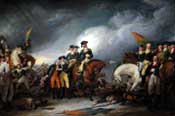Trenton - New Jersey Historic Site

THE BATTLE OF TRENTON
After some humiliating defeats at Quebec and Long Island, George Washington’s troops were undersupplied, feeling demoralized and underappreciated by the Continental Congress, which provided only limited support for their campaigns. Washington knew that with inadequate resources, his chances against a much larger and better equipped British Army were questionable at best. A writer came to his aid. After emigrating from England, Thomas Paine became editor of the Pennsylvania Magazine and very much interested in politics, which he’d dabbled in across the ocean in Great Britain. As the embers of revolution began burning, Paine shared the beliefs of many colonists who wanted independence from Great Britain and penned a pamphlet which stoked the flames even further. His book ‘Common Sense’ forcefully advocated independence from England and became so popular, it sold 100,000 copies in the first three months after its release in January 1776. The book compelled its readers to open their minds to new ideas of liberty and equality- and make a break with tradition. This one pamphlet is considered by many historians as among the most important reasons for the success of the American Revolution.
Paine followed up later in 1776 with his book ‘The American Crisis’, which argued for action despite the precarious situation the colonists found themselves in. As his men sat around their campfires on December 8, 1776 following a harried retreat across the Delaware from northern New Jersey, General Washington knew his case was desperate. Adding to his worries was the fact that he’d just lost 2,000 troops who’d left for home after their enlistment expired. The words Paine wrote were so moving, Washington had a copy of his book and ordered it read aloud to his troops. It begins:
“These are the times that try men's souls: The summer soldier and the sunshine patriot will, in this crisis, shrink from the service of their country; but he that stands it now, deserves the love and thanks of man and woman. Tyranny, like Hell, is not easily conquered; yet we have this consolation with us, that the harder the conflict, the more glorious the triumph…”
Today the Battle of Trenton is marked at the Washington Crossing State Park where you can walk the trails and stop at the visitor center museum and Johnson Ferry House.
